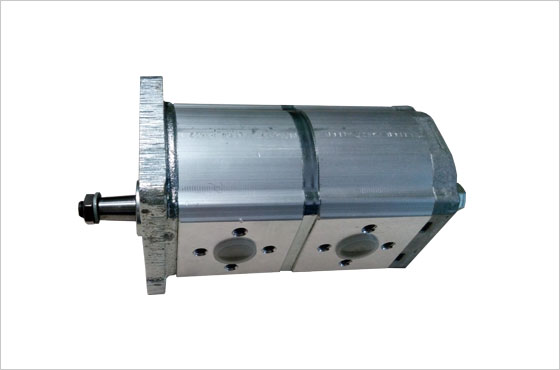Hydraulics Pump For Cement Raw Mills
Hydraulics Pump For Cement Raw Mills

Description :
Hydraulic pumps are integral to the operation of cement raw mills, ensuring the continuous and efficient grinding and crushing of raw materials. Hydraulic pumps are essential for the effective and efficient operation of cement raw mills, particularly in maintaining the pressure and lubrication needed for grinding. Their role in supporting load, controlling movement, and ensuring smooth operation makes them a critical component in the cement manufacturing process. Regular maintenance and appropriate system design are key to maximizing their performance and lifespan.
Various components are used in manufacturing Hydraulics Pump For Cement Raw Mills.
Hydraulic Cylinders that convert hydraulic energy into mechanical energy to move or lift components. Hydraulic Motors are used to convert hydraulic pressure into rotational motion, driving various mechanical systems within the mill. Accumulators are used to store hydraulic energy and smooth out pulsations in the hydraulic system. Valves and Actuators control the flow and pressure of the hydraulic fluid, ensuring precise operation of the system.
Feature of Hydraulic Pumps in Cement Raw Mills:
Hydraulic pumps create the necessary pressure to move hydraulic fluid through the system, which in turn powers various hydraulic actuators. They help support the weight of the grinding rollers in vertical roller mills (VRMs), allowing for the precise control needed for effective grinding. Hydraulic pumps supply oil to lubrication points to minimize friction and wear, ensuring smooth operation and longevity of the equipment. They assist in lifting the grinding table for maintenance or other operational needs.
Advantages of Hydraulic Systems in Cement Mills:
Hydraulic systems play a crucial role in the operation of cement mills, providing several advantages that enhance efficiency, reliability, and performance. Hydraulic systems in cement mills offer precise control, high power density, smooth operation, load handling capability, enhanced safety, energy efficiency, flexibility, durability, ease of maintenance, and environmental benefits. These advantages make hydraulics an indispensable part of modern cement mill operations.
- Precise Control : Hydraulic systems offer high precision in controlling various functions within a cement mill, such as adjusting the pressure on rollers or controlling the movement of equipment. This precise control helps in achieving the desired fineness of the cement and maintaining consistent quality.
- High Power Density : Hydraulic systems can generate substantial force and power from relatively small and compact units. This high-power density is beneficial for heavy-duty applications in cement mills, where significant forces are needed to crush and grind raw materials and clinker.
- Smooth Operation : Hydraulics ensure smooth and continuous operation of machinery. The fluid power systems can absorb and dissipate energy variations, reducing shock loads and mechanical vibrations. This smooth operation extends the lifespan of the equipment and reduces maintenance costs.
- Load Handling Capability : Hydraulic systems are well-suited for handling heavy loads, which is a common requirement in cement milling. They can easily adjust to varying load conditions and provide consistent performance without the risk of overloading or overheating.
- Enhanced Safety : Hydraulic systems can incorporate safety features such as overload protection and fail-safe mechanisms. These features ensure safe operation under various conditions, reducing the risk of accidents and equipment damage.
- Energy Efficiency : Modern hydraulic systems are designed to be energy-efficient. They can provide variable power output according to the demand, reducing energy consumption compared to mechanical or electrical systems that might operate continuously at full power.
- Flexibility and Modularity : Hydraulic systems offer flexibility in design and installation. Components can be easily configured, modified, or expanded to suit specific operational requirements. This modularity is advantageous for cement mills where processes and demands can change over time.
- Durability and Reliability : Hydraulic systems are known for their robustness and long service life. They can withstand harsh working environments and high-pressure conditions typical in cement mills. The reliability of hydraulic components minimizes downtime and enhances overall productivity.
Application in Vertical Roller Mills (VRMs)
In cement raw mills, particularly VRMs, hydraulic systems are critical. The grinding process requires consistent pressure and force to crush the raw materials (limestone, clay, and other additives) into the fine powder that is later processed into cement.
- Roller Pressure : The hydraulic pump supplies the pressure to the grinding rollers, allowing them to grind the raw material against the grinding table.
- Table Movement : Hydraulic pumps help in adjusting the height and tilt of the grinding table for optimal grinding efficiency.
Concentric Pump are very popular with leading VRM manufacturers like SMS, FLS.
Avid Impex stocks & supplies Concentric-(Haldex) Germany the major part no. GPA- 2-16-E-30-R, GPA3-63-E-30-R, WP09A3 triple tandem pump part nos 1801584 1801688 , WP09A2 double pump part no 1800752, WP15A1 part no 1830653, WP15A3 part no 1830794 etc. for this application.
We also offer HAWE - GERMANY radial piston pump model nos R1.6-0.8-0.8 ,R2.5 & several HAWE valves RK-2G,RK-4G valves.
We majorly Export in UAE, Saudia Arabia, IRAQ, Turkey, Oman, Jordan, Egypt, Qatar, Tunisia, Sudan, Tanzania, INDONESIA, China, Hongkong, Singapore, Malaysia, Pakistan, Bangladesh, Chile, Russia, Sri Lanka.
Our existing customers in these countries :- AL Takamol cement co ltd, Lafarge CEMENT, Pioneer CEMENT. etc.
For special projects or OEM enquiries kindly get in touch with Tushar Rane (Hydraulic business head) sales@avidimpex.net / whatsapp No. 9324338031

